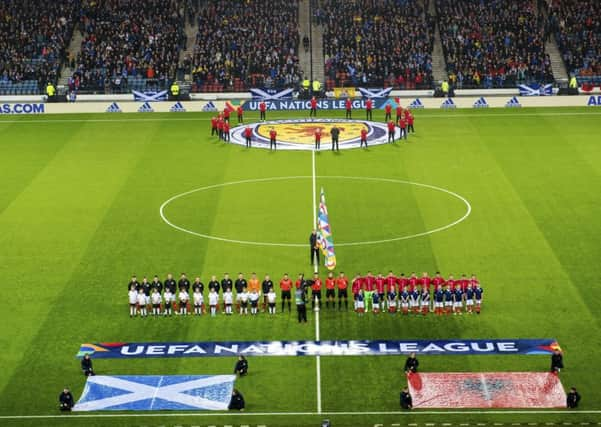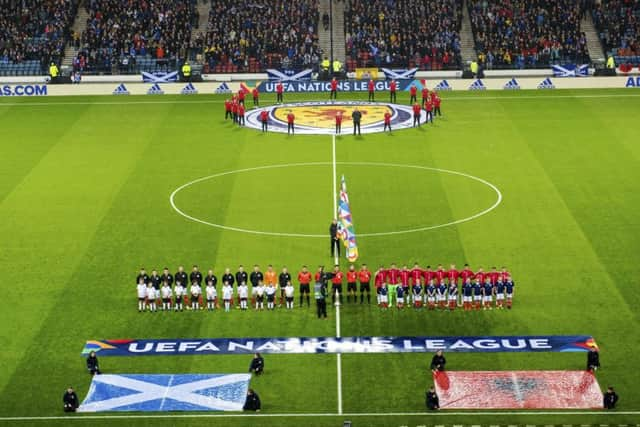Hampden jaded but still has plenty to offer Scotland


“It is the most magnificent stadium I have ever seen, the life and essence of football,” said the magical Magyar who had just orchestrated a peerless Hungarian side’s 4-2 win over Scotland in front of just over 113,000 spectators.
It was doubtless a heartfelt sentiment from one of the world’s greatest players at a time when Hampden was indisputably one of the pre-eminent footballing venues on the planet.
Advertisement
Hide AdAdvertisement
Hide AdTimes have changed since that bitterly cold afternoon in December 1954, of course, and the latest eastern European visitors to the old lady of Mount Florida might not have had as glowing a first impression of the place last night.


In the week when Hampden’s fate as the home of the Scottish international team is expected to be announced – in all probability with a decision to stay put and reject the option of a move east to Murrayfield – the inaugural Uefa Nations League fixture against Albania did not find the stadium in its best light.
Drumming up enthusiasm for this game had become all the more difficult for the Scottish FA in the aftermath of Friday night’s 4-0 friendly defeat by Belgium. The steady rainfall provided further disincentive to attend for any wavering Scotland supporters who would have opted for the comfort of their living rooms or local instead.
It was a gloomy backdrop for a fixture already laden with significance in the early stages of Alex McLeish’s second spell as Scotland manager. The size of the crowd certainly didn’t mirror the significance of a contest which was the first step on what should be an easier road to ending the nation’s long absence from major tournament finals.
Among the complaints often levelled at Hampden by its detractors is the alleged poor view of the action from behind both goals. That wasn’t an issue on this occasion with the banks of seating at both the traditional Celtic and Rangers ends of the ground empty.
Much of the criticism directed at the stadium has become lazy and cliched in recent months, straying into the realms of exaggeration during the debate over whether the Scottish FA should leave it behind and become tenants of Scottish Rugby.
While the room and desire for improvements in the make-up of Hampden are clear, claims that it lacks atmosphere have been proved risibly wide of the mark regularly over the past few years. Domestic cup finals and high-intensity Scotland internationals, such as the 2-2 thriller against England last year, have shown Hampden still has plenty to offer.
But on nights like this one, when the record books are being thumbed to check on the lowest attendances for a competitive fixture at the ground, enthusiasm is clearly more difficult to generate. The turnout of 17,455 was the lowest for such a game this century, albeit not threatening the all-time nadir of 11,375 who watched a European Championship qualifier against Romania in 1975.
Advertisement
Hide AdAdvertisement
Hide AdThat said, those Tartan Army regulars who remained loyal to the cause were assisted by a noisy and surprisingly sizeable Albanian support to ensure Scotland’s first outing in Group C1 of Uefa’s new tournament did not completely lack noise or colour.
There was sufficient encouragement for the home fans as McLeish’s men dominated proceedings from the start – but also a familiar sense of frustration as they failed to translate their superiority into a lead before half-time.
The omission of Leigh Griffiths from the starting line-up was only one of the unexpected aspects of McLeish’s team selection and his strike force of Steven Naismith and Johnny Russell both contrived to miss glorious chances to make the breakthrough. Naismith’s close-range header against a post wasn’t quite in the Chris Iwelumo league of Hampden sitters but the Hearts man will still be wondering today quite how he failed to bury the opportunity.
Naismith more than redeemed himself in the second half, easing the growing tension among the Scotland fans with his role in Berat Xhimshiti’s own goal for the 47th-minute breakthrough and then, after some typically anxious moments which required Allan McGregor to be at his best to deny Albania an equaliser, heading home to make it 2-0 and allow McLeish to breathe relatively easily for the rest of the night.
It was a crucial victory for McLeish ahead of the remaining fixtures against Israel and Albania in a three-team group offering an exceptional chance to secure at least a qualifying play-off spot for Euro 2020 at which Hampden will be one of the host venues.
Next up at the stadium for Scotland is the friendly visit of Portugal next month. Hopefully, the presence of Cristiano Ronaldo will help draw a healthy attendance. Even if he is unlikely to be as impressed by the place as Ferenc Puskas was all those years ago, reports of Hampden’s demise may yet be premature.